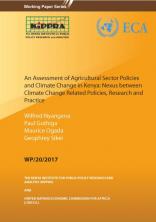WP20 Climate Change Policies Nexus Between Policy Research and Practice

Since Thomas Malthus’ ‘An Essay on the Principle of Population’, policy makers have debated the challenges of feeding a growing and changing global population, (Ola Linner, 2003). Climate change and climate variability are the latest challenge and potentially the most dangerous. According to the United Nations (UN), Food and Agriculture Organization (FAO) and the World Bank, the goal of modern agriculture policy is to produce a global state of food security (Schmidhuber and Tubiello, 2007). This is already a great challenge. Global climate change is set to further destabilize the global food security situation, demanding new policy frameworks that directly address all aspects of the problem.
Agriculture is the most important sector in Sub-Saharan Africa (SSA) and it is set to be hit hardest by climate change. Climate change with its efects on temperature and precipitation threatens this important economic activity. Small-scale farmers that dominate the sector and derive their livelihoods from agriculture are reliant on rainfall. These farmers face the challenges of land degradation, poor soil fertility management, and continuous cropping. Sluggish growth in agricultural productivity translates into slow overall growth and general low per capita income levels. Kenya is one of the SSA countries in which agriculture is the backbone of the economy. The adverse impacts of climate change on agriculture are unmistakable in Kenya. Therefore, the performance of the sector has a signiicant efect on national output and corresponding income and poverty levels. The sector is also vital to the country’s socio-economic security. Climate change and climate variability will cause substantial welfare losses, especially for smallholders whose only source of livelihood is agriculture. There is need for the nation to neutralize the potential adverse efects of climate change if welfare losses to this vulnerable segment of society are to be avoided.